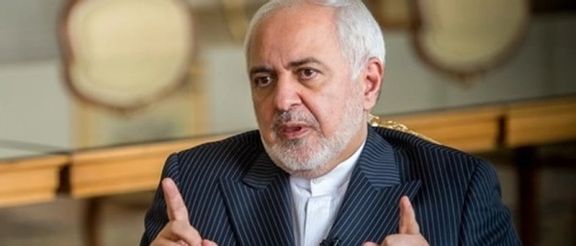Iran's Zarif In Hot Water After Admitting He Misspoke Over Nuclear Text

Former Foreign Minister Mohammad Javad Zarif is again under fire after conceding he unintentionally misled parliament over the text of Iran’s 2015 nuclear deal.

Former Foreign Minister Mohammad Javad Zarif is again under fire after conceding he unintentionally misled parliament over the text of Iran’s 2015 nuclear deal.
Speaking in a Clubhouse session Wednesday evening, Zarif admitted he had wrongly told parliament July 21, 2015 that the word ‘lift’ rather than ‘suspend’ had been consistently used in the wording of the agreement, the JCPOA (Joint Comprehensive Plan of Action) in relation to sanctions.
"The mistake was mine when I said the word 'suspend' does not appear in the JCPOA,” said Zarif, who was deeply involved in two years of negotiations leading to the 2015 agreement, which was abandoned by United States president Donald Trump in 2018 as he introduced ‘maximum pressure’ sanctions on Iran. Zarif was himself sanctioned by the US in 2019.
Following the Clubhouse session, hardliner critics took to social media to call Zarif a traitor. A hashtag demanding his prosecutionhas been set up.
Calls for prosecution
"Zarif's ignorance of the text of the nuclear agreement must be thoroughly investigated and those responsible [for including the word 'suspend'] must be prosecuted," said lawmaker Zohreh Elahian, who sits on parliament's National Security and Foreign Policy Committee, Wednesday.
Hossein Kanani-Moghadam, another hardliner, slammed Zarif for his ignorance: "A nation put its trust in Zarif … to defend the country's interests. How could he agree on a text the content of which, particularly sensitive terminology, he was not aware of?"
"For forty years the Islamic Republic's diplomacy has been in the hands of this group that is dependent [on Western powers],” tweeted Abdolreza Davari, ex-adviser to former principlist president Mahmoud Ahmadinejad. “They have caused nothing but damage…Zarif's friends for forty years stood alongside the enemy".
In Wednesday’s Clubhouse session, Zarif explained to the audience that the negotiation team had been ordered to avoid certain terminology, presumably including the word ‘suspend,’ but had agreed to the word due to a technicality regarding the European Union's position.
According to Zarif, while negotiating the text of one of the JCPOA appendices, the European representative had said that the EU could not 'lift' all its sanctions before UN sanctions were removed and therefore the word 'suspend' was used in some places. Zarif added that the Iranian negotiator had had not informed him of this – and the word appeared in the agreement as signed July 14.
‘This is a lie’
"The matter of suspension had nothing to do with the United States, it was related to the EU sanction … that were supposed to be lifted later," Zarif said in his defense. "But they [his critics] used this, and said Zarif had not read the text of the JCPOA…This is a lie, the Western [negotiators] will definitely tell you if you ask them."
Journalist Amir-Reza Nazari tweeted in defense of Zarifthat the JCPOA text was later scrutinized by parliament, the Supreme National Security Council, and the watchdog Guardian Council. "Why didn't they notice?" he asked.
Mojtaba Davoudi, a reformist activist, asked in a tweet if the use of 'suspend' instead of 'lift' in the JCPOA appendix had caused any real harm.
Opponents of the JCPOA attacked Zarif just as much as President Hassan Rouhani over the agreement, especially when the US imposed stringent sanctions in 2018.
Zarif was in May reprimanded by Supreme Leader Ali Khamenei after leaked audio revealed him criticizing the role of former Qods Force Commander Qasem Soleimani in Iranian diplomacy. Already a principlist hero for organizing resistance to the Islamic State group (Isis-Daesh) in Iraq, Soleimani was killed by a US drone strike in Baghdad in January 2020.